An object A is kept fixed at the point x=3m and y=1.25m on a plank p raised above the ground . At time t=0 the plank starts moving along the +x direction with an acceleration 1.5m/s2. At the same instant a stone is projected from the origin with a velocity →u as shown . A stationary person on the ground observes the stone hitting the object during its downward motion at an angle 45(∘) to the horizontal . All the motions are in the X−Yplane . Find →u and the time after which the stone hits the object . Take g=10m/s
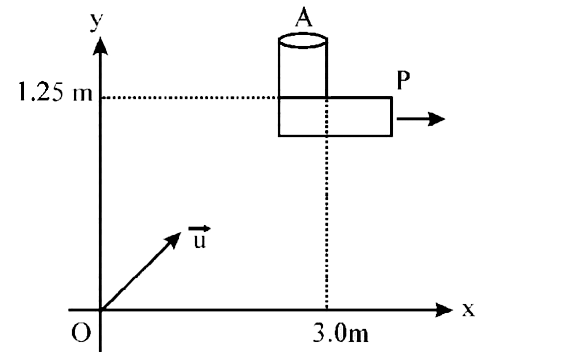
Video Solution
Text Solution
Let the stone be promected from (O) with velocity (u), making an angle θ with X-axis . It hits the object Aandat B∈time9t).Itmeans,theobjectgoresom A to B∈time9t).Letvec vbethevelocityofs→≠at B. Fig. 2 (APC). 5.<br><imga≤ocr_imageload∈g=lazysrc=https://d10lpgp6xz60nq.cloudfront.net/physics_images/PR_XI_V01_C02_S01_537_S01.pngwh=80%mx-autosty≤=background:white;>.<br>Tak∈ghorizontalmotionom O to B,here
OB−1=OA1+A−1B−1
So ucosθθt=3.0+12×1.5t2 ...(i)
Taking vertical motion from O→B, here
1.25=(usinθ)t22>2 ...(ii)
Also vcos45∘=ucosθ ...(iii)
and −vsin452=uθ−> ...9iv)
Diveding (iii) by (v) , we get
−1=(ucosθ0usinθ−> or ucosθ+usinθ=>
or u(cosθ+sinθ0=> ....(v) ltBrgt From(ii),(usinθ)t=1.25+12>2 ...9iv)<br>Add∈g(i)and(vi),wehave<br> ut (cos theta + sing theta )<br>=3.0 + 1/2 1.5 t^2 + 1.25 + 1/2 gt^2<br> gt^2 = 4.25 + 1/2 xx 3/2t^2 = 1/2 gt^2[From(v0]
10t2=4.25+0.75t2+5t2[∴g=10ms−2]
or 910 - 5.75 ) t^2 = 4. 25 or t^2 = 1 or t= 1 s<br>Pu∈g t= 1 s∈(i)and(ii),wehave<br> u cos theta = 3.0 = 1/2 xx 1.5 1^2 = 3. 75...(vii)
:. u^2 (cos^2 theta + sin ^2 theta ) = (3. 75(=)^2 = 9 6.25)^2<br>or u= sqrt( (3.75)^2 + ( 6.25 )^2 ) = 7. 30 ms^-1)<br>Divg(viiii)by(vii),wehave<br> tan theta (6. 25) /(3.75) = 5/3 or theta tan ^(-1) ( 5/3).
|
Updated on:21/07/2023
Related Playlists
- BOOK - PRADEEPCHAPTER - KINEMATICSEXERCISE - NCRT Exercises22videos
KINEMATICS
- BOOK - PRADEEPCHAPTER - KINEMATICSEXERCISE - Additional Exercises13videos
KINEMATICS
- BOOK - PRADEEPCHAPTER - KINEMATICSEXERCISE - 6 Long answer (NCERT)9videos
KINEMATICS
- BOOK - PRADEEPCHAPTER - GRAVIATIONEXERCISE - Assertion-Reason Type Questions19videos
GRAVIATION
- BOOK - PRADEEPCHAPTER - LAWS OF MOTIONEXERCISE - Assertion- Reason Type Questions17videos
LAWS OF MOTION
Similar Practice Problems
- Question 1 - Select One
A body starts from rest from the origin with an acceleration of 3m/s(2) along the x-axis and 4m/s2 along the y-axis. Its distance from the origin after 2s will be
A5mB10mC15mD20m - Question 1 - Select One
A body starts from rest from the origin with an acceleration of 6m/s2 along the x-axis and 8m/s2 along the y-axis. Its distance from the origin after 4 seconds will be
A56 mB64mC80 mD128m - Question 1 - Select One
An object starts from rest at the origin and moves along the x axis with a constant acceleration of 4m/s2. Its average velocity as it goes from x=2 m to x=8 m is :
A2 m/sB3 m/sC5 m/sD6 m/s - Question 1 - Select One
An object at rest at the origin begins to move in the +x direction with a uniform acceleration of 1m/s2 for 4s and then it continues moving with a uniform velocity of 4 m/s in the same direction. The x-t graph for object's motion will be -
A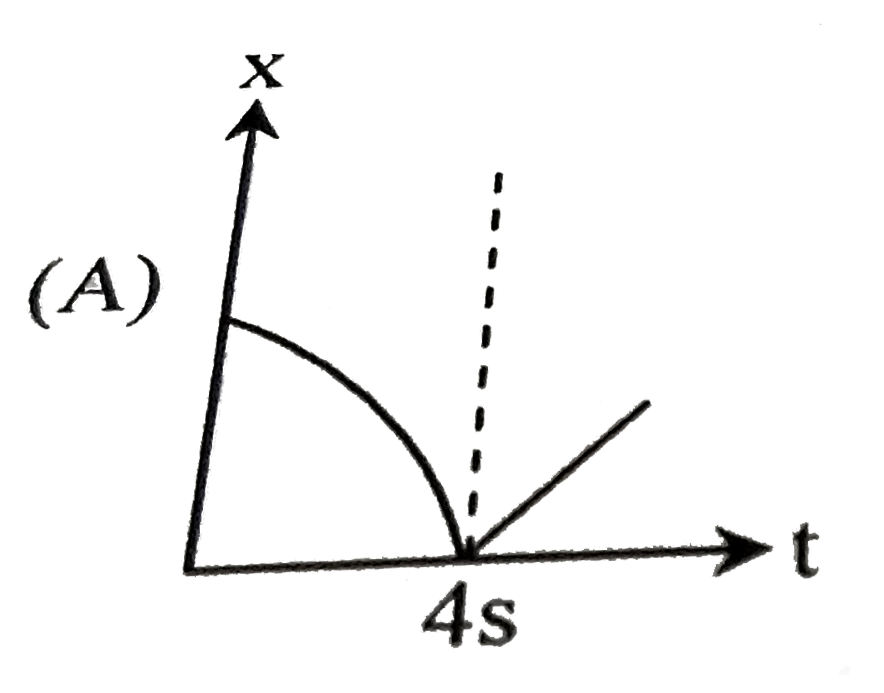 B
B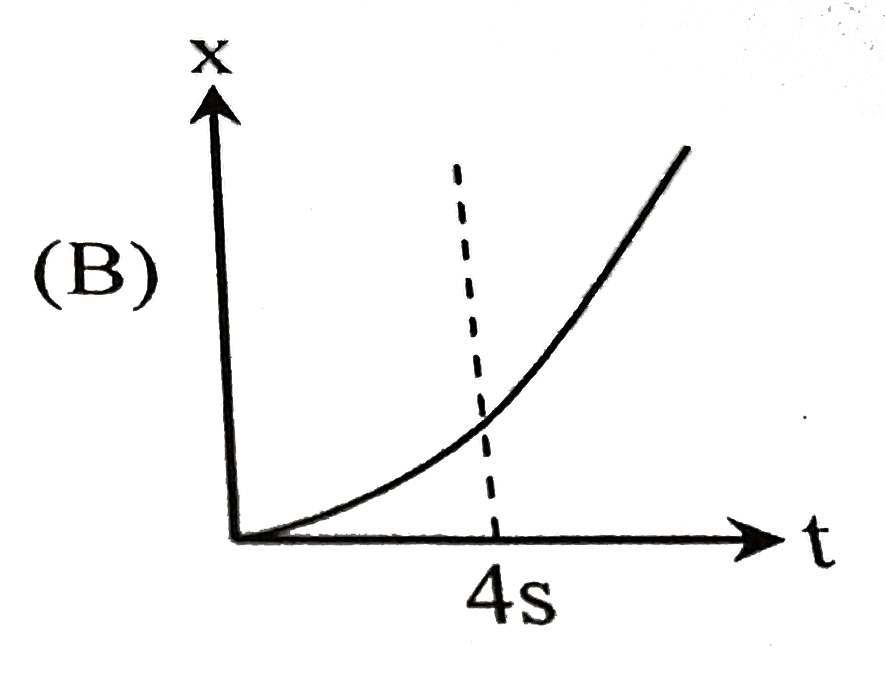 C
C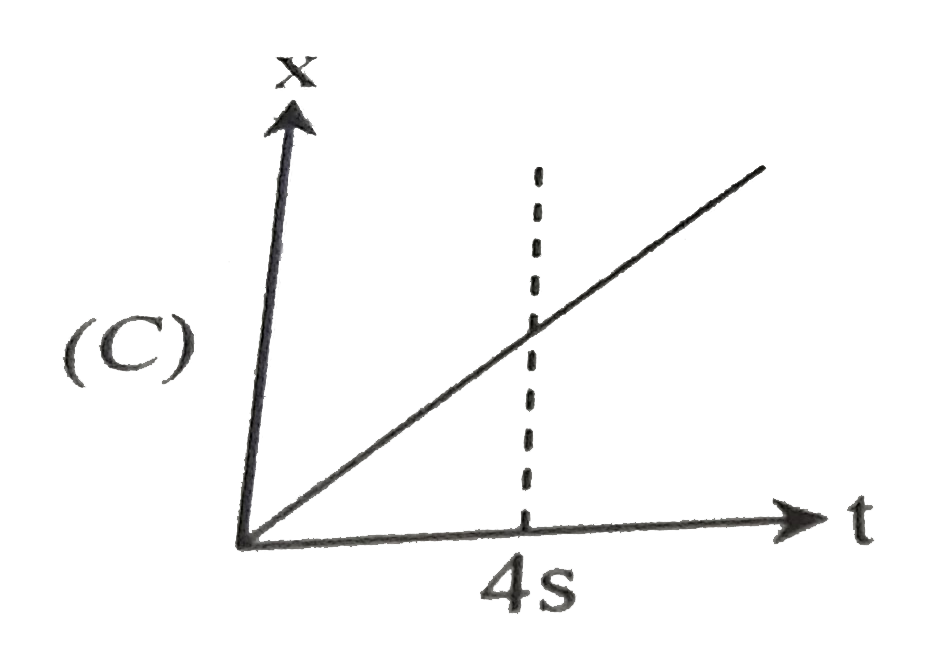 D
D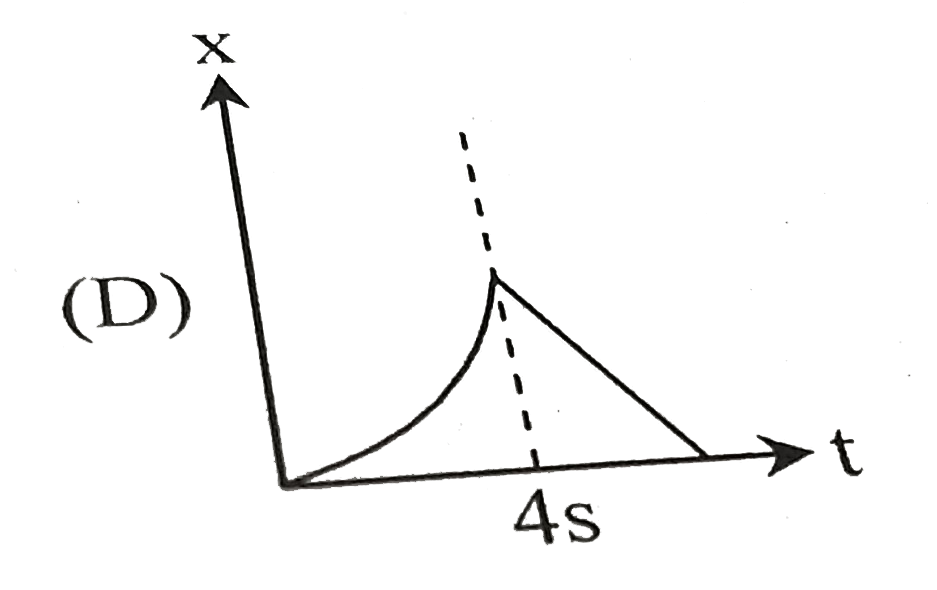
- Question 1 - Select One
A body starts from rest from the origin with an acceleration of 6m/s2 along x axis and 8m/s2 along y axis.The distance from origin after 4 seconds will be
A56mB64mC80mD128m - Question 1 - Select One
The acceleration of a particle moving along x-direction is given by equation a=(3−2t)m/s2. At the instant t=0 and t=6s, it occupies the same position.
(a) Find the initial velocity vo
(b) What will be the velocity at t=2s?A2m/sB15m/sC25m/sD5m/s - Question 1 - Select One
At time t=0 s a car passes a point with velocity of 16m/s and thereafter slows down with acceleration a=−0.5tm/s2 ,where t is in seconds. It stops at the instant t=
A32sB16sC8.0sD4.0s
Similar Questions
A stone is allowed to fall from the top of a tower 100m high and at the same time another stone is projected vertically upwards from the ground with a velocity of 25m/s. Calculate when and where the two stone will meet.
View SolutionA stone is allowed to fall from the top of a tower 100m high and at the same time another stone is projected vertically upwards from the ground with a velocity of 25ms.Calculate when and where the two stones will meet.
View SolutionA stone is dropped from a height of 100m .At the same instant another stone is projected vertically upwards with velocity of 50ms^(-1) .If g=10ms^(-2) ,the height from the ground at which the 2 stones meet is
View Solution

